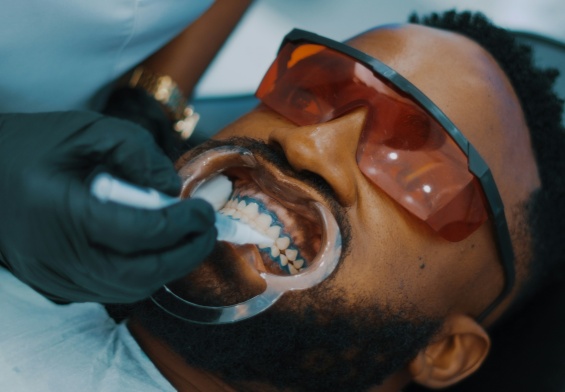Thirty percent of people all across the globe suffer from dentin hypersensitivity, more commonly called tooth sensitivity, a common, quite frustrating issue that disrupts your ability to enjoy everyday things like hot coffee or ice cream. It often manifests as that sudden sharp pain when your teeth encounter hot, cold, sweet, or acidic foods. That being said, an understanding of the causes of sensitive teeth is the first step in knowing how to stop tooth sensitivity.
What is Tooth Sensitivity?
Tooth sensitivity is what happens when the protective layers of your teeth are compromised, so the dentin underneath becomes exposed. Dentin has microscopic tubules in it that lead to the nerves inside your teeth. When they’re exposed by things like enamel erosion, gum recession, or other factors, sensitive teeth triggers—such as heat, cold, or acidic substances—gets to the nerves via these tubules, which causes pain or discomfort.
Common Causes of Sensitive Teeth
-
Worn Tooth Enamel
- Enamel is the hard, outer layer that protects your teeth above the gum line. It can wear down over time due to various factors, such as brushing too aggressively, acidic foods and drinks, or teeth grinding. Dentin lies underneath this barrier, so when it’s compromised, your teeth become much more sensitive.
-
Exposed Tooth Roots
-
- Gum recession, a common result of gum disease or improper brushing techniques, can expose the roots of your teeth. The roots don’t have enamel, they have cementum, which is slightly softer than dentin. Thus, tooth roots are more susceptible to sensitivity. Proper oral hygiene and more gentle brushing can help prevent gum recession and protect your roots from exposure.
-
Cavities and Tooth Decay
-
- Cavities can damage your teeth’s enamel and expose the dentin, causing sensitivity. Tooth decay makes the structure of your teeth weaker, giving the stimuli mentioned above ways to reach the nerves inside your teeth. You can reduce your risk of cavities and tooth decay with good oral hygiene and by limiting your intake of sugary foods.
-
Cracked or Chipped Teeth
-
- Cracks and chips in your teeth let stimuli access the insides of your teeth, especially the nerves. Of course, this causes sensitivity to air, temperature changes, and certain foods. If you see any cracks or chips in your teeth, contact the best cosmetic dentist NJ to repair the damage and keep it, as well as the associated sensitivity, from getting worse.
-
Worn Fillings or Dental Work
-
- Dental fillings can wear out and become loose over time, and dentin becomes exposed when that happens. Dental procedures like crowns or inlays can also sometimes leave gaps that lead to sensitivity. Be sure to see your dentist regularly for check-ups to catch and fix issues with worn dental work before they become more severe.
-
Gum Disease and Recession
-
- Gum disease tends to make your gums pull away from your teeth, increasing sensitivity by leaving the roots exposed. You can prevent this with proper brushing and flossing, along with regular professional cleanings.
-
Use of Whitening Products
-
- Whitening products are great, sure, but overusing them makes your teeth more sensitive by chemically eroding the enamel. Products with high concentrations of peroxide contribute a lot to enamel erosion. If your teeth are getting more sensitive while using whitening products, think about switching to one with less harsh chemicals or using the ones you like less often.
-
Dental Procedures
-
- It’s normal for your teeth to be temporarily sensitive after dental procedures like cleanings, fillings, or root planing. This sensitivity should be temporary and go away with time as your gums and teeth adjust. If it sticks around, talk to your dentist.
DIY Treatments for Tooth Sensitivity
Tooth sensitivity can definitely be annoying, but knowing how to fix sensitive teeth at home goes a long way towards preventing it:
-
Use Desensitizing Toothpaste
-
- Desensitizing toothpastes have chemicals that dull the pain signals from the tooth surface to the nerve. Regularly using the best toothpaste for sensitive teeth and gums can significantly reduce sensitivity over time. Look for toothpastes specifically designed for sensitive teeth and use them when you brush your teeth every day.
-
Adjust Your Brushing Technique
-
- Brushing is something you should be doing every day but doing it too hard or using a toothbrush with bristles that are too hard can wear down enamel and irritate your gums. You want to use a soft-bristled toothbrush and gentle, circular motions when you’re brushing your teeth. This way, you preserve your enamel and minimize your risk of your gums receding.
-
Limit Acidic Foods and Drinks
-
- Foods and beverages with a lot of acid, like citrus fruits, soda, and wine, can erode your enamel. Enjoy these things in moderation, and when you do, rinse your mouth with water afterward to neutralize the acids.
-
Maintain Good Oral Hygiene
-
- Regular brushing and flossing are some of the best things you can do to keep your mouth healthy and prevent issues like cavities, gum disease, and sensitivity. In addition to this, visit your dentist regularly for check-ups and professional cleanings.
-
Use a Mouthguard if You Grind Your Teeth
-
- Grinding your teeth also grinds down the enamel over time. If you’re a teeth grinder, especially at night, get a mouthguard to protect your teeth from damage.
When to See a Dentist
If the DIY treatments for tooth sensitivity listed above don’t help, then you need to see your dentist. They can help you find the root cause of your sensitivity and recommend the appropriate treatments for your specific needs, like fluoride applications, crowns, or in extreme cases, a root canal.
How to Fix Sensitive Teeth at Home
Tooth sensitivity is a totally manageable condition when you take the right approach. With an understanding of the main causes of sensitive teeth and taking preventive measures, you can reduce discomfort and enjoy your favorite foods and drinks without pain. Remember, maintaining good oral hygiene and seeking professional advice when needed play a huge role in protecting your teeth and reducing sensitivity.



